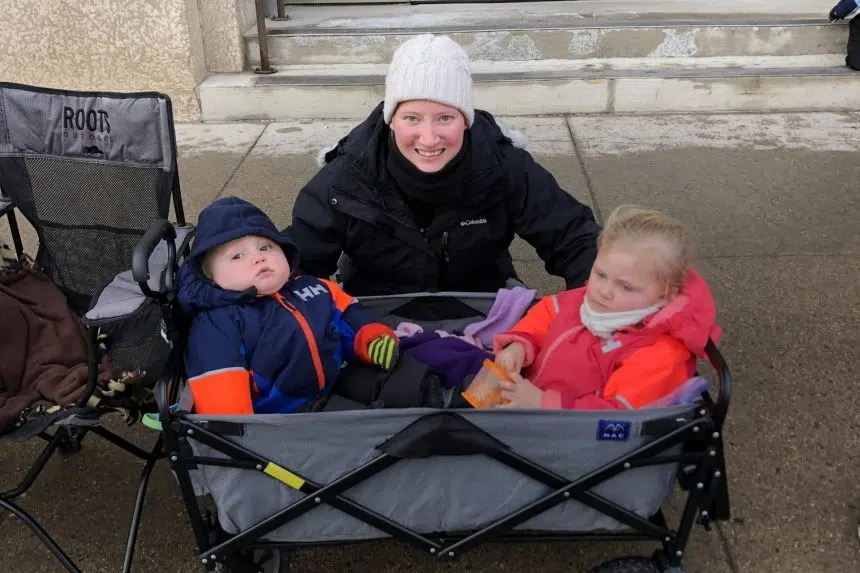A Saskatchewan mom is asking people to stay home when they’re sick to stop the spread of influenza after she and her two children wound up in the hospital multiple times in the past week.
Martina Paziuk and her whole family have to get the flu shot every year because she is immunocompromised. Unfortunately she said the flu shot wasn’t enough to protect her family this flu season; three of them tested positive in the hospital this week for influenza A.
“It knocked me out pretty bad and my two kids as well. My (three-year-old) daughter was just fighting me and now she just passed out in my arms,” Paziuk said in a phone interview from her home, where she is recovering and taking care of her sick kids.
Paziuk has a low white blood count so she has to see a doctor or go to the emergency room whenever she has a temperature. She wound up in the ER last Friday and Saturday and had to be hospitalized in isolation for days of additional tests and treatment.
She returned to the ER again on Tuesday night, only to have to turn back to Saskatoon when she got home in the early hours of Wednesday morning. Paziuk picked up her sleeping children to move them back to their beds and realized they were burning up with fevers.
“My mom was holding my son when he started vomiting and having a febrile seizure so we called 911 and had paramedics take us to hospital,” Paziuk recalled.
She actually had to go back to the ER for an IV while doctors sent her 15-month-old son for X-rays to check for pneumonia; they also tested both her children for influenza. He was sent home with a puffer and a doctor called later that night to confirm both children had tested positive for influenza A.
“They’re both just wiped. They’re just sleeping. We’re rotating Tylenol (and) Advil and just trying to keep them hydrated so we don’t have to go spend another week in the hospital,” Paziuk said Thursday.
She is thankful they all managed to stay out of the ICU, but Paziuk said this highlights the importance of staying home to stop the spread of sickness that can get extremely serious very quickly.
“I run a dayhome. I guess my message is, ‘If your kid has a fever, don’t send them. Wait 24 hours. Don’t be giving your kids Tylenol and thinking they’re OK,’ ” she said. “Yes, they have Tylenol in their system (and) they’re going to run around and play.
“Both my kids have influenza A right now. My 15-month-old was climbing this morning and running around and 45 minutes later he’s out cold and coughing and just dead to the world and lethargic.”
For Paziuk and others who have weak immune systems, catching influenza is dangerous in any year. She begs people to think twice before going to work or sending kids to school with fevers because in her case it could have ended in a far scarier situation. Her three-year-old would have had to call 911 if Paziuk hadn’t been proactive going to the ER.
“I might not be here,” she said.
According to Saskatchewan Health, this is a fairly typical flu season, which appears to have peaked in the middle of January. There have been 11 deaths in adults — mainly with underlying health conditions — and 25 people have been admitted to the ICU, including three young children.
Deputy Chief Medical Health Officer Dr. Saqib Shahab said the flu vaccine is developed each year based on predictions of which strains will be going around, but officials won’t know exactly how effective it is until the end of the flu season.
While getting a shot is still the most effective form of protection against influenza, he said there are always cases of people who get the flu shot and still get sick. It works better for people who are young and healthy, but it’s still especially important for people with underlying health conditions to get vaccinated, even if it is not a guarantee that they won’t get sick.
“That’s why it’s important that if you have someone in your household who has a health condition, everyone around them should also get the flu shot because that forms a ring of protection around someone who may not be fully protected in spite of getting a flu shot,” Shahab explained.
“Even if you got the flu shot, obviously you can get influenza, but it may be less severe than if you hadn’t got the flu shot.”
As an example, he said the immunization rate for seniors in long-term care facilities is higher than 80 per cent, yet there are still regular outbreaks with 47 this year alone.
While it is never too late to get the flu shot, Shahab reiterated the message to stay home if you are sick and to regularly wash your hands.











